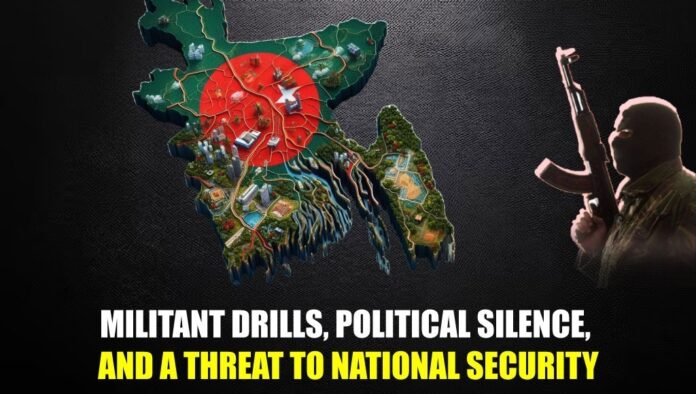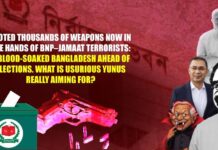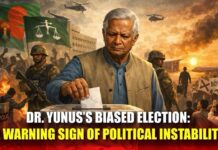Bangladesh once again finds itself enveloped in the fear of militancy. Across different regions of the country, banned extremist groups—JMB, ISIS, and their pseudonymous offshoots—are becoming active once more. According to administrative sources, they are not only holding secret meetings but are also conducting public drills, organizing under the guise of religious attire, and spreading fear and uncertainty among ordinary citizens.
What is particularly alarming is that the political and ideological patronage behind this resurgence of militancy is becoming increasingly evident. Allegations suggest that these extremist factions are receiving shelter and financial backing under the shadow of Jamaat-e-Islami, Shibir, Hefazat, and the NCP. Rural madrasas, mosques, and some religious organizations are now being used as centers for reorganizing militants. The growing social prejudice against bearded and traditionally dressed individuals is also a consequence of this extremist politics.
The silence of law enforcement agencies has made the situation even more complex. Authorities are aware but taking no effective action; intelligence agencies too are failing to bring the situation under control. Even if state sponsorship is not direct, silence and negligence have effectively turned into a form of indirect support. As a result, militant networks are becoming more powerful, and national security is increasingly at risk.
Meanwhile, discussions have surfaced about the silent support of groups close to Dr. Yunus, in addition to the long-standing links between the BNP–Jamaat alliance and these militant organizations. This coalition—anti-Liberation, ultra-Islamist, and foreign interest–driven—is pushing the country toward a deep security crisis. Their primary goal is to exploit democracy and religion as tools for anti-state activities.
The people of Bangladesh do not want militancy. They want peace and security; they seek coexistence, not division in the name of religion. Yet, this rise of militancy is building a wall of fear and distrust among the general population. The suspicion toward Islamic scholars and clerics that has emerged stems from the crimes of these extremists—those who, under the guise of religion, are in fact dishonoring it.
The time has come for the state to take a firm stand. Using or tolerating militancy for political gain amounts to treason. The administration must be held accountable, and the political patrons of militancy must be brought to justice.
Militancy is not the problem of any single political party—it is a question of the nation’s very existence. Once this fire spreads, it will be difficult to extinguish. To restore Bangladesh to the path of peace, tolerance, and rule of law, decisive and united action must be taken now. Otherwise, history will once again be written in blood—because of a silent state and blind politics.





